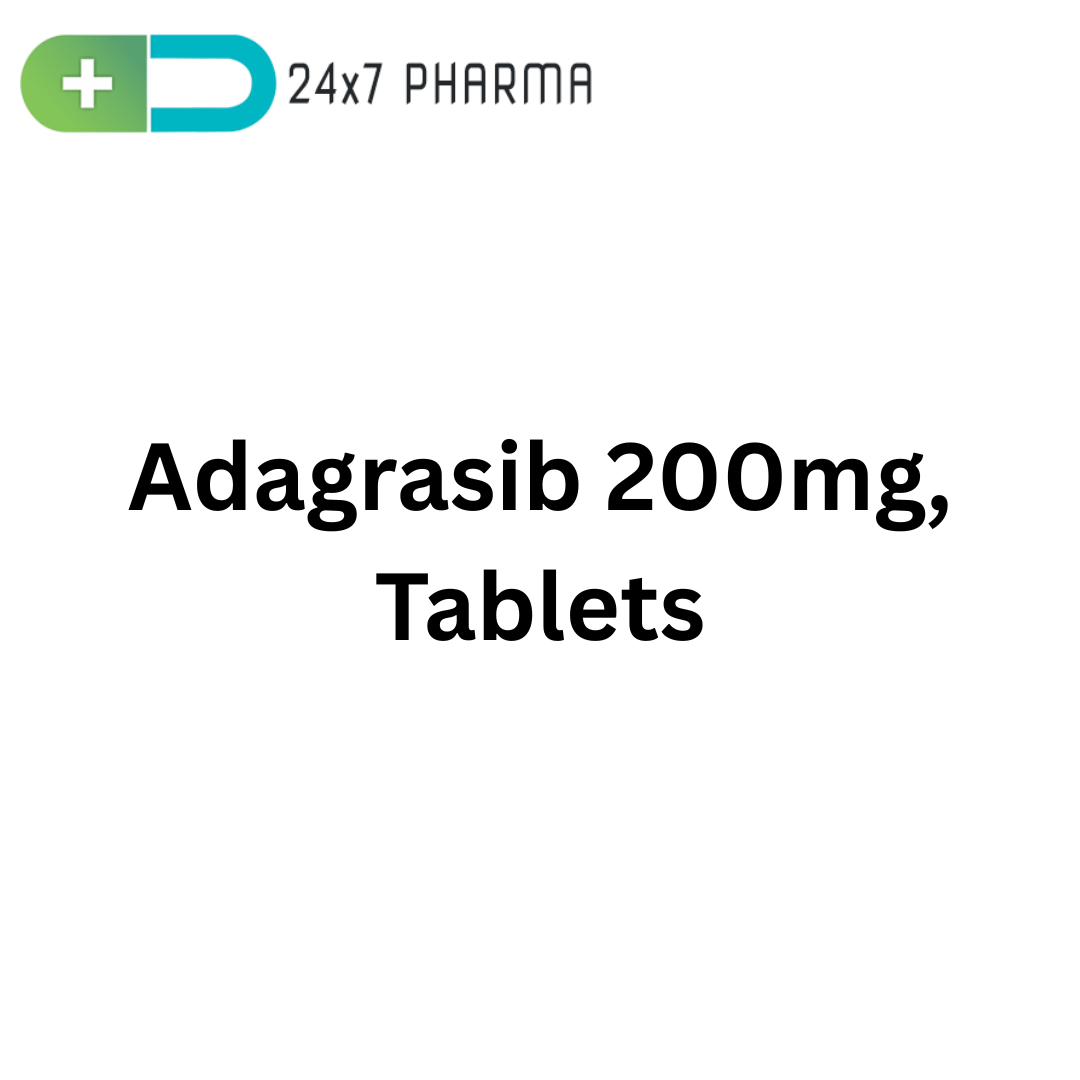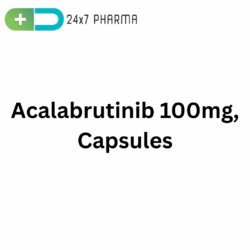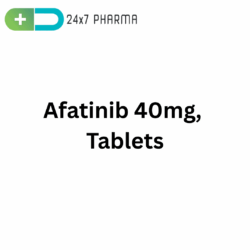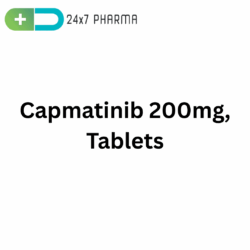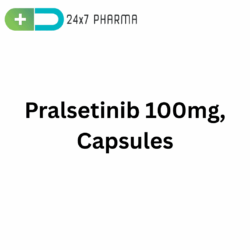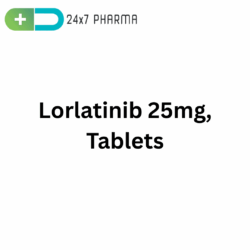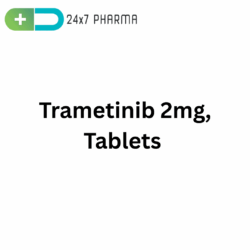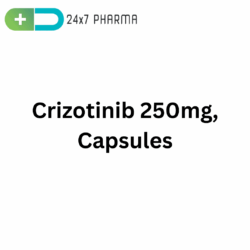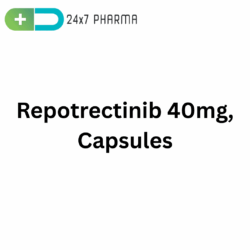LuciAda 200mg, Adagrasib Tablets
LuciAda 200mg is a generic formulation of Adagrasib, a targeted therapy. Adagrasib is an oral, irreversible inhibitor of the KRAS G12C mutation, a specific genetic alteration found in certain cancers, particularly non-small cell lung cancer (NSCLC). LuciAda is indicated for the treatment of adult patients with KRAS G12C–mutated locally advanced or metastatic NSCLC who have received at least one prior systemic therapy.
What Is LuciAda 200mg, Adagrasib?
Adagrasib, the active ingredient in LuciAda 200mg, is a targeted medication intended to treat specific types of cancer. It is primarily utilized for:
- Non-Small Cell Lung Cancer (NSCLC): Specifically for patients with a KRAS G12C mutation who have experienced disease progression after prior therapies.
- Colorectal Cancer: For cases harboring the KRAS G12C mutation.
- Other solid tumors as identified in clinical trials.
Adagrasib is not a traditional chemotherapy drug. Instead, it is part of a newer class of drugs known as targeted therapies, which work by interfering with specific molecular pathways that help cancer cells grow and survive.
How Does LuciAda Work?
LuciAda’s active ingredient, Adagrasib, targets the KRAS G12C mutation, which is a common genetic driver in several types of cancer. In normal cells, the KRAS gene helps control cell division. When it is mutated (as in KRAS G12C), it can lead to uncontrolled cancer cell growth.
Mechanism of Action:
- Adagrasib targets and permanently inactivates KRAS G12C by covalently modifying the mutant cysteine residue.
- It keeps the protein in its dormant state.
- This blocks downstream signaling pathways (like MAPK and PI3K), which are essential for cancer cell survival and proliferation.
- As a result, it induces cell cycle arrest and promotes cancer cell death (apoptosis).
- This targeted approach helps reduce damage to normal cells and offers a personalized treatment strategy for patients with this mutation.
How to Use LuciAda 200mg
LuciAda 200mg comes in oral tablet form and is taken by mouth.
Other Dosages
While LuciAda is commonly available in 200mg, the manufacturer may offer other strengths such as:
- 100mg (for dose adjustment based on tolerance)
- 50mg (for patients with severe side effects or liver issues)
- Dose modification may be necessary based on:
Severity of side effects
- Drug interactions
- Patient’s weight, age, and liver function
Side Effects
Common side effects of LuciAda include:
- Gastrointestinal: Diarrhea, nausea, vomiting.
- Hematologic: Anemia, decreased appetite.
- General: Fatigue, musculoskeletal pain, edema.
Serious adverse effects may include:
- Liver toxicity: Elevated ALT, AST, or bilirubin
- Prolonged QT interval: Potential for irregular heartbeats
- Interstitial Lung Disease (ILD) or Pneumonitis: Inflammation of lung tissue
- Kidney function changes
- Electrolyte imbalances
Monitoring Required:
- Frequent blood tests to monitor white blood cells and liver function
- ECG to monitor heart rhythm
- Pulmonary evaluation if respiratory symptoms occur
If any side effects are severe or persistent, contact your healthcare provider immediately.
Prescription Information
LuciAda 200mg (Adagrasib) is a prescription-only medication (Rx). It is prescribed only after:
- Confirming the presence of the KRAS G12C mutation using a validated diagnostic test.
- Assessing the patient’s prior treatment history, health status, and disease stage.
- Only oncologists or specialists with experience in managing advanced cancers should prescribe LuciAda.
Drug Interactions
Adagrasib may interact with other medications, including:
-
CYP3A4 Inhibitors (e.g., ketoconazole, clarithromycin):
May increase blood levels of Adagrasib, leading to enhanced toxicity.
-
CYP3A4 Inducers (e.g., rifampin, St. John’s Wort):
Can reduce LuciAda’s effectiveness by lowering its concentration in the body.
-
QT-prolonging drugs (e.g., certain antidepressants or antiarrhythmics):
May raise the risk of heart rhythm issues.
Advice:
Always inform your doctor about all medications, herbal supplements, and vitamins you are taking.
Avoid grapefruit juice, as it may interfere with drug metabolism.
FAQs
Q1: Can LuciAda be used in combination with other therapies?
Yes, LuciAda may be used alone or in combination with other cancer treatments, depending on the specific cancer type and patient condition.
Q2: Is LuciAda suitable for elderly patients?
There is no significant difference in efficacy or safety between elderly patients and younger adults. However, close monitoring is recommended.
Q3: Is LuciAda a chemotherapy drug?
No. LuciAda is a targeted therapy, not a traditional chemotherapy. It selectively inhibits cancer cell growth without broadly attacking all fast-dividing cells.
Q4: Can LuciAda cure cancer?
LuciAda is not a cure but may significantly slow disease progression and improve quality of life in patients with KRAS G12C-positive cancers.
Q5: Is LuciAda available in generic form?
As of now, LuciAda is a brand-name product and may not have a widely available generic equivalent.
Conclusion
LuciAda 200mg (Adagrasib) represents a major advancement in personalized cancer treatment, especially for patients with the KRAS G12C mutation, which was previously considered an “undruggable” target. With its ability to directly inhibit KRAS G12C, it offers new hope for patients with advanced lung, colorectal, and potentially other cancers.
Its oral administration, targeted mechanism, and manageable side effect profile make it a preferred option compared to traditional chemotherapies for selected patients.
However, like all cancer therapies, it is crucial to:
- Follow dosing instructions strictly
- Monitor for side effects
- Maintain close communication with your healthcare team
Early identification of complications and personalized dose adjustments can help maximize the benefits of LuciAda while minimizing risks.

